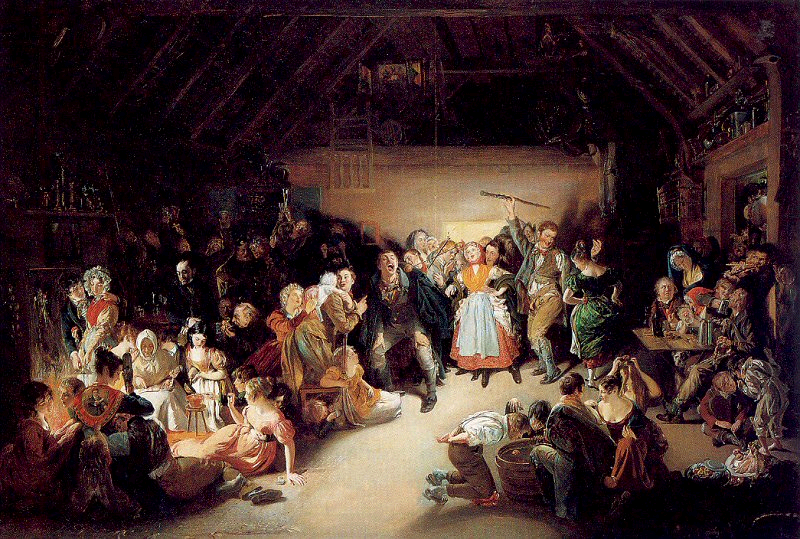
With the end-of-the-year string of holidays fast approaching, we already see decorations and supplies showing up in stores, whether for Halloween, Thanksgiving, or even Christmas.
Most people would likely peg me for a bit of a holiday Scrooge. When it comes to Advent, for example, I’m critical of some of the consumeristic excess and the disruption of the liturgical calendar. I consider Advent a penitential season of fasting and abstinence—not exactly things we’d associate with Black Fridays and Cyber Mondays—and I often encourage Christians to live in contrast to our more common cultural norms.
On the other hand, I am also strangely heartened by the end-of-the-year market shenanigans. Amid the consumerism, we also see the market helping people celebrate things that are truly worth festal jubilation. Feasts are happy expressions of piety, and such piety is requisite for nearly all spheres of life: civic, economic, ecclesiastical, domestic, and more. It often involves burdensome duties that must be fulfilled, but not all duties are burdensome.
In a feast, the duty is joy, particularly manifested in celebration.
Let’s focus on the last three months of the year, during which the dominant holidays are Halloween, Thanksgiving, and Christmas. Other holidays are present, as well, such as Hanukkah. Three quarters are explicitly religious holy days. Two are Christian, one is civic (with strongly religious overtones), and one is Jewish (also celebrated by some Christian families). This is where I find myself encouraged.
These popular holidays are worth celebrating. The history of Halloween as we know it today is complicated and somewhat enigmatic. Its Christian roots, however, lie in All Saints Day. All Hallow’s Eve commemorates the saints that have gone on before and enjoyed victory over the world, death, and satanic force. We’ve nothing to fear from “our ancient foe” that “seeks to work us woe” if we abide in Christ, remaining steadfast in the faith (arguably, dressing up as various spiritual beings like witches, vampires, werewolves, and devils is a way of making light of these spiritual forces and their impotency in the face of God’s mighty grace).
Thanksgiving falls within a long heritage of civic calls to gratitude to God for His many blessings, as He is the Giver of all good things. Hanukkah is a time to remember religious zeal of the Maccabean Revolt as it faced the idolatry and spiritual corruption of the Seleucids, which concluded with religious renewal and rededication. Christmas, of course, focuses on the incarnation of the Son of God (and is accompanied by several other feasts: St. John, Holy Innocents, and St. Stephen).
How do we celebrate? With food, frivolity, and giving to those we love. Centuries of custom and inventiveness come on display: seasonal treats, silly games, beloved music, religious observance (often with one’s best clothes), neighborly activities like guising, caroling, wassailing, trick-or-treating, belsnickeling, and more.
In such a context, the market can help facilitate our celebrations. Where are we going to get that turkey, that candy, those baking supplies, those presents, those decorations, and more? What if we want to listen to those carols while addressing our Christmas cards? Who is going to supply these good things? Well, by purveyors of these fine goods, of course. Moreover, we don’t want to go out shopping when we are actually with our friends and family, who may have traveled and set aside time to be with us. So we buy our supplies early.
Obviously, there is no small amount of schmaltz and kitsch that arises from these dynamics. Things aren’t always up to code in terms of good taste and high class. Further, many who participate in these festivities deny the very grounds and foundation for this joy, in both their beliefs and in their actual lives. How many Hollywood Christmas films seem to struggle with the “meaning of Christmas,” ignoring the truth uttered by Linus so many years ago?
Yet those who do participate in these holidays in good faith and fear are able to avail themselves of various means and opportunities to have their cheer. The market provides these means and opportunities. While there is surely a profit motive at work in producing these goods and services, the result is of benefit to we who want to heartily and jovially celebrate the best things and works.
In doing so, Christians will disrupt the monotony of the year with their feasting, regardless of what sorts of things they can purchase. The triumph of the saints, the kind provision of many blessings, and the incarnation of the Son of God will not be forgotten by faithful Christian people.
Image: Snap-Apple Night, Daniel Maclise, 1832 (Public Domain)

